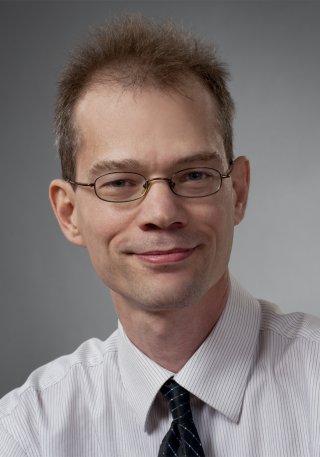You are here
Scott Smith

Dr. Scott Smith, an assistant professor in the Department of Community and Preventive Medicine at the University of Rochester Medical Center in Rochester, N.Y., considers himself fortunate.
Diagnosed profoundly deaf at age 1 in Winston-Salem, N.C., he had supportive primary and high school education, which included sign language interpreters. That support continued when he majored in biochemistry at East Carolina University in Greenville, N.C. There, he received his M.D. at the university’s Brody School of Medicine. He began a general pediatric residency at the Children’s Hospital at Eastern North Carolina University.
“One of the reasons I stayed so long in North Carolina was that I had grown comfortable with their system,” he says. “They knew who I was, we had identified interpreters who were committed. Once you get in a good situation, it’s easier to stay in that good situation rather than going someplace else.”
But Smith wanted to expand his boundaries, so he traveled to Boston where he did a fellowship in general academic pediatrics at Massachusetts General Hospital for Children. While there, he earned a master’s degree in Public Health at Harvard University and did a second clinical fellowship on the Floating Hospital for Children, part of Tufts Medical Center.
Each step of the way, qualified interpreters enabled him to interact with his patients and his peers.
In 2004, Smith came to Rochester as an attending pediatrician specializing in pediatric behavior at Rochester General Hospital.
“When I worked as a full-time clinician, 95 percent of my patients were hearing,” he says. “I functioned very much like any other doctor in community practice. I had interpreters all the time here when I saw patients.”
Technological advances have also allowed Smith to do his job as a hearing physician would, with some minor changes. Some deaf physicians use amplified stethoscopes that connect to their cochlear implants or hearing aids. Smith has no usable residual hearing, so that option doesn’t work for him. Instead, technology has allowed him to use a graphic auscultation system, which produces visual waves representing the sounds made when a patient breathes. Smith relies on his eyes to “listen” to his patients’ heartbeats and breathing patterns.
Smith would like to see more collaboration between colleges and deaf professionals to find out what technological inventions may help them be more successful.
“We need to make a concerted effort to make significant improvements in technology to support us as well as the quality of interpreting service that is available to deaf professionals in the future,” he says.
Interpreters usually have been accustomed to view a deaf person as a consumer of information provided by someone else, not as providers of that information. “Interpreters have to be able to bridge both worlds,” he says.
Smith says he has never experienced a negative reaction from a patient because he is deaf. “The key is how I present myself to my patients,” he says. “I work very closely with my interpreter to make sure the information I am delivering is clear and confident. And patients are interested in sign language, especially children. They don’t see me as disabled with a capital D. They think it’s interesting, novel.”
If society truly wants deaf individuals to pursue careers in health care fields on an equal basis to their hearing peers, it is important to realize that accommodations for deaf people to do a good job are not always inexpensive, he says.
“It's going to require the funding from somewhere in order for us to support more employment for deaf people,” Smith says. “In order to bring more people into the health care system as providers, we need to come up with some creative solutions to remove the financial constraint that prevents deaf professionals from contemplating working in the health care field. I would love to remove the stress in the relationship between deaf professionals and the people employing them so everyone would become more productive and successful.”